Resources
21 January 2024
6:30pm
Is Jesus enough?
A while back, a student in our church family asked to chat with me. She’d been accosted in Northumberland Street by people with questionnaires and Bibles, and they’d asked if she was a Christian, and how she’d become one, and what church she belonged to. And then they’d basically said, ‘That’s good as far as it goes. But to be a real Christian, you now need to be properly baptised and live under spiritual discipline.’ And it turned out that ‘being properly baptised’ meant being baptised by them, and that ‘living under spiritual discipline’ meant joining them. In fact, they were a cult – ‘The International Church of Christ.’ And that student, who was a new Christian, was really unsettled, because it left her wondering ‘Is Jesus enough?’ Because here were professing Christians saying ‘Actually, you haven’t been told the whole story. It’s good that you know about Jesus. But to be a real Christian, there’s something else you need to add.’ And if you’ve not met that kind of thing yet, you will. And Galatians is the ‘spiritual vaccine’ to protect you when you do. Because it was written to new Christians being unsettled by exactly the same kind of thing. So would you open a Bible to Galatians 4.8, where Paul writes this to these people who’d recently come to faith in Jesus:
Formerly, when you did not know God [in other words, before you knew the one, true God of the Bible], you were enslaved to those that by nature are not gods
In other words, the many ‘gods’ (in inverted commas) which the world around them had made up.
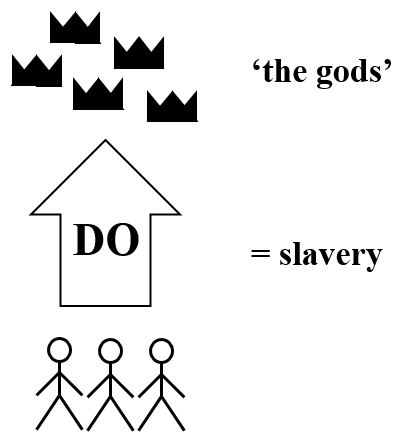
So there’s a picture of the Galatians before they knew Jesus – trying to do enough to make the gods accept them and bless them: trying to pray enough, or offer enough sacrifices, and so on. And Paul says: that’s slavery – because you’re never sure you have done enough; so you always have to do more. Which is where billions of people are today, in the man-made religions of the world. Maybe that’s where you are.
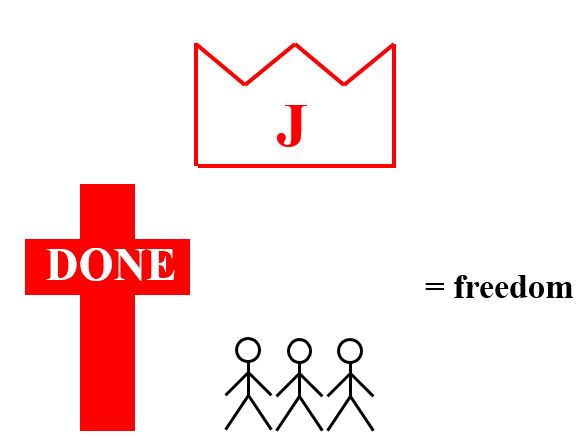
But next picture: Paul came along and told them there was just the one, true God of the Bible; and that through his Son Jesus’s death on the cross, he’d already done everything it took to make them acceptable to him. And they simply had to trust that, to come into relationship with him. And in Galatians, Paul says: that’s freedom: you’re free from trying to do enough to make God accept you, because you know he’s already accepted you, thanks to the cross. So Paul planted churches, like the ones in Galatia, among Gentiles – ie, non-Jews (Gentile just means ‘all the other nations’). But he was followed by Jewish Christians who caused the same problem as the ‘The International Church of Christ’ caused that student I mentioned at the start. Because these Jewish Christians also said ‘It’s good that you know about Jesus. But there’s something else you need to add.’
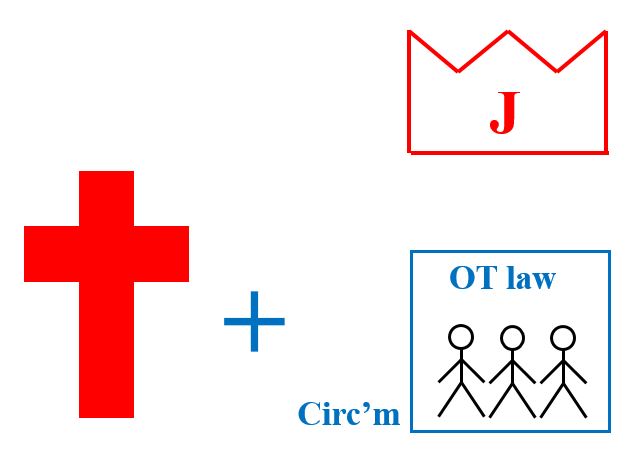
And, next picture, they said: ‘You need to add: being circumcised (if you’re a man), and starting to live under the Old Testament law. Because the Old Testament says that being circumcised is a sign of being in relationship with God, and that living under the Old Testament law is the way to live in relationship with God. So that if you won’t be circumcised or live under the Old Testament law, you’re basically saying ‘I don’t want relationship with God.’ And that is what the Old Testament says.
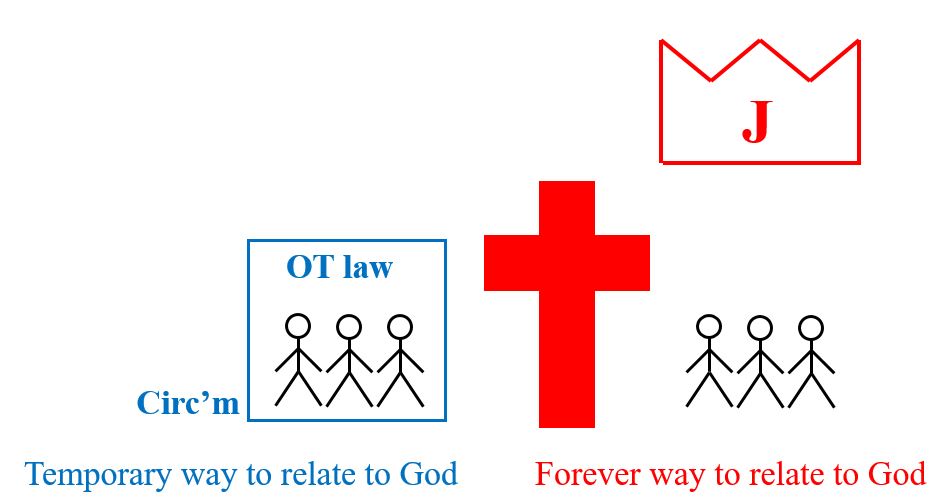
And, next picture, in Galatians, we’re going to see Paul explaining that circumcision and the Old Testament law were how God provided a temporary way to relate to him before Jesus came. But that Jesus came to provide the forever way of relating to him – which doesn’t require us to be circumcised or live under the Old Testament law. But these Jewish Christians who followed Paul around said otherwise. And people often call them ‘Judaisers’ because they said that Gentile Christians must be circumcised and live under the Old Testament law, just like Jews. So modernisers try to make things modern. Sanitisers try to make things clean. Judaisers try to make you live like an Old Testament Jew. And they followed Paul wherever he planted churches, and unsettled new Christians everywhere. Which is why Paul had that head-to-head with the other apostles that we heard about last week. So turn back over the page to Galatians 2.1, where Paul writes:
Then after fourteen years I went up again to Jerusalem with Barnabas, taking Titus along with me.
So Jerusalem was the Jewish Christians’ Head Quarters – so not ‘GCHQ’ but ‘JCHQ’. And Paul made a trip there from his work among Gentiles. And he brought a Gentile Christian with him – Titus. Which was very tactical. Because Paul wanted to know: ‘Are you going to make Titus get circumcised and start living under the Old Testament law? Or do you accept that God accepts him simply because he’s trusting in Jesus?’ And Galatians 2.3:
But even Titus, who was with me, was not forced to be circumcised, though he was a Greek.
So Paul’s fellow-apostles said, ‘If Titus is trusting in Jesus and his death, then God accepts him – and so do we. And if Titus is living for Jesus as Lord, that’s all God asks of him – and we ask nothing more.’ So that was great! Paul and James and Peter and John and the other apostles were agreed on the gospel. But then Peter acted completely out of line with it. Look at Galatians 2.11, to revise a bit more from last week:
But when Cephas [aka Peter] came to Antioch, I opposed him to his face, because he stood condemned.
So Peter has made the reverse trip to Paul. He has come from ‘JCHQ’ to ‘GCHQ’ – the Gentile Christians’ Head Quarters – because Antioch was the first big Gentile church. And (Galatians 2.12):
before certain men came from James, [Peter] was eating with the Gentiles
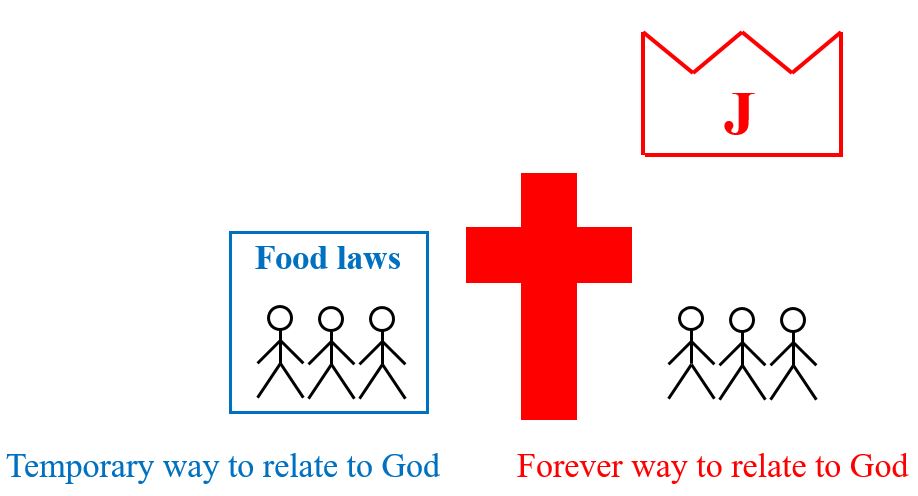
Because, next picture, Peter knew that the Old Testament law was God’s temporary way to relate to him until Jesus came, and that included the food laws –(like not eating pork) which were designed to make God’s people look different from the other nations. But now Jesus had come to create a multi-national people of believers in him, those food laws no longer applied. And so Peter happily went along to Gentile prayer breakfasts with bacon butties. But then these Jewish Christians arrived from Jerusalem and said, ‘Look Peter, the Jews back home have heard about the bacon butties. And they reckon it shows you think God’s law doesn’t matter. Which is making them even angrier with us, and even harder to reach with the gospel. So why don’t you just step back?’ And Galatians 2.12 says:
when they came [Peter] drew back and separated himself [from the Gentile Christians], fearing the circumcision party.
But what are you saying if you won’t have fellowship with someone? Now of course, Peter wasn’t actually saying anything. But Peter’s actions were saying to the Gentile Christians, ‘I don’t accept you.’ And the Gentile Christians would have thought, ‘That must mean he doesn’t think God accepts us. Not as we are, anyway. He must think we need to add living under the Old Testament law as well.’ Which is why Paul weighed in as he did in Galatians 2.14:
But when I saw that their conduct was not in step with the truth of the gospel, I said to Cephas [aka Peter] before them all, “If you, though a Jew, live like a Gentile and not like a Jew, how can you force the Gentiles to live like Jews?”
So Paul basically says to Peter: ‘If you won’t accept these people into fellowship with you, then you’re saying by your actions that you don’t think God accepts them, either. And you’re implying there’s something else they must do in order to be accepted by God.’ So Paul sees that the gospel is at stake. Because the heart of the gospel (or good news of Jesus) is that God can accept us – but only through what Jesus has done. Whereas Peter was implying there’s something we must do, too. So next in Galatians, Paul starts talking about how God can accept us – or to use Paul’s big word, how God can justify us. OK, we needed that lengthy bit of background. But now here’s my first heading:
1. We’re justified through faith in Jesus – and nothing else (Galatians 2.15-16)
Look at Galatians 2.15-16 Paul writes:
We ourselves are Jews by birth and not “Gentile sinners”; yet we know that a person is not justified by works of the law but through faith in Jesus Christ, so we also have believed in Christ Jesus, in order to be justified by faith in Christ and not by works of the law, because by works of the law no one will be justified.
And before we can make sense of that, we need to understand that word justified. So here’s a definition: ‘To be justified is for God to declare that we are in the right with him, that all our sin (past and future) is forgiven, and that we will never face any condemnation for it.’ And being justified is about our status, not about our behaviour. So this side of heaven, our behaviour will never be all right – we’ll never be sinless. But if we’re justified our status is that at every moment God says ‘You are all right with me, I accept you, sinner though you are.’ So now look at Galatians 2.15 again:
We ourselves [so Paul is thinking of himself and Peter and all Jewish Christians] are Jews by birth and not “Gentile sinners”
And “Gentile sinners” is in inverted commas because Paul is quoting the typical way that Jews thought of Gentiles.
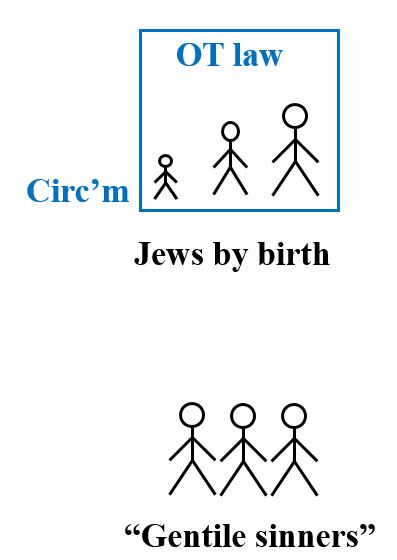
So next picture: Jews by birth typically thought they were superior to “Gentile sinners”, above them. After all, they’d lived under God’s Old Testament law from the word go. Whereas those ignorant Gentiles had lived the most awful, sinful lives. And that’s how Paul had thought, before he knew Jesus. The fact that he’d been born a Jew, and circumcised, and knew God’s law back to front, and was working at keeping it had made him forget that, underneath all that, he was still as much of a sinner as any Gentile. Just like being born to Christian parents, and baptised, and knowing your Bible back to front, and so on may have made you forget that, underneath all that, you’re still as much a sinner as anyone you’ll meet tomorrow or hear about in the news. Do you believe that?
Paul finally came to believe that when he met the risen Jesus on the Damascus Road – and had the awful realisation that Jesus was God’s Son and his rightful Lord, but that he’d rejected him totally. And that’s sin. Sin isn’t doing things wrong. Sin is why we do things wrong – it’s the attitude to God and Jesus his Son that says, ‘I don’t want you in my life.’ And on the Damascus Road Paul realised he’d been saying that. He realised that underneath what made him think he was OK (all his works of the law as he calls them here) he was not OK. And so he says, back to Galatians 2.15-16:
We ourselves are Jews by birth and not Gentile sinners; yet we know that a person is not justified by works of the law, but through faith in Jesus Christ, so we also have believed in Christ Jesus, in order to be justified by faith in Christ and not by works of the law, because by works of the law no one will be justified.
So to be justified is for God to declare that we are in the right with him. And Paul says that happens through faith in Jesus – and nothing else. Which means ‘through trusting in what Jesus did for us on the cross – and nothing else.’ And what Jesus did on the cross was to take the condemnation our sins deserve, so that we might be forgiven and accepted and never condemned. And so to be justified, I need to trust 100% in what Jesus did for me on the cross – and 0% in anything I do for him. Which is really humbling because I have to admit there’s nothing I can do to make myself acceptable to God. But it’s also really freeing because I can let go of trying to do enough. Here’s how the hymn Rock of Ages puts it:
Not the labour of my handsCan fulfill your law’s demands;Could my zeal no respite know,Could my tears forever flow,All for sin could not atone,You must save, and you alone.Nothing in my hands I bring,Simply to your cross I cling;Naked, come to you for dress,Helpless, look to you for grace:Foul, I to the fountain fly,Wash me, Saviour, or I die[A.M. Toplady (1740-78), Rock of Ages].
So, we’re justified through faith in Jesus and nothing else.
2. The point of the Old Testament law was to show us our sin and our need of Jesus (Galatians 2.17-19)
Look on to Galatians 2.17:
But if, in our endeavour to be justified in Christ, we too were found to be sinners, is Christ then a servant of sin?
So Paul imagines the Judaisers saying, ‘But…hold on, Paul. If in the process of becoming a Christian, you (a Jew who’s tried to keep God’s law) ended up having to say you’re still as much of a sinner as any Gentile then doesn’t that mean it was pointless trying to keep God’s law? And that it was pointless even having God’s law? And that you might just as well have sinned as much as you liked? So isn’t your gospel encouraging sin? Isn’t Christ a servant of sin?’ To which Paul says (end of Galatians 2.17-18):
Certainly not! For if I rebuild what I tore down, I prove myself to be a transgressor.
So, what had Paul torn down? Well, Paul had torn down the idea that living under the Old Testament law made you right with God. And Paul had torn down the idea that those trusting in Jesus still had to live under the Old Testament law.
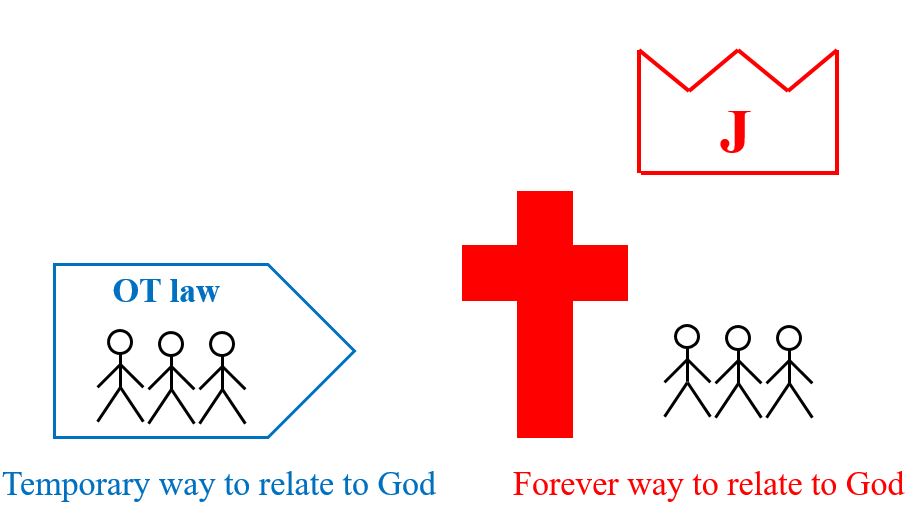
Because just look at this picture again. Once Paul was a Christian, God led him to re-think his whole view of the Old Testament law. And God showed him that it was only a temporary way for sinners to relate to him until Jesus came – but that it did nothing to solve the sin-problem. Instead, it pointed forward, away from itself, to the one who really could solve the sin-problem – Jesus. And that’s what Paul means in Galatians 2.19 where he says:
For through the law I died to the law, so that I might live to God.
He means, ‘Through re-reading the law, now that Jesus has come, I realised that the law had always been saying to Israel, ‘Your relationship with me needs to end – you need to die to me (so to speak) and go to Jesus to live in relationship with God through him.’ So that was the point of the Old Testament law in God’s plan. That was the point of Israel living under it and failing to keep it, all that time. It was to show us our sin and our need of Jesus.
I remember in primary school, the local dentist came in to do an assembly on brushing your teeth, and he gave us each one of those pink pills which show up plaque. And you dissolve them in water, have a rinse, and then what you thought were beautifully clean teeth are covered in tell-tale patches of pink. But that’s all the pink pill can do. It can only show up your plaque problem; it can’t solve it. For that you need a toothbrush. And the Old Testament law was like the pink pill. It could show up the human sin problem through the story of Israel. But it couldn’t solve it because for that you need a Saviour. So please don’t misread the Bible, thinking it’s primarily a rule book (about what we need to do for him) because it’s primarily a rescue book (about what we need him to do for us).
3. Jesus’ death and resurrection have settled where we stand with God forever (Galatians 2.20)
So, we’re justified by faith in Jesus – and nothing else. The point of the Old Testament law was to show us our sin and our need of Jesus. And now Paul reminds us what Jesus has done that puts us right with God. And it’s his death and resurrection. So you’d expect Paul to say something like Christ died for our sins, but he actually says (Galatians 2.20):
I have been crucified with Christ.
What does that mean? Well, Paul is thinking back to Good Friday and saying ‘I was crucified there with Christ – in God’s sight, I was there on the cross, in Christ.’ And he’d say that of you if you’re trusting in Jesus. He’d say: ‘In God’s sight, you were there on the cross, in Christ, as well.’ And we want to say ‘But hold on, I didn’t even exist then.’ But that’s because we’re inside time and can only think inside time. Whereas God is outside time, and knew about everything that would happen inside time before time began. So on Good Friday, God knew everything about you, your life, your entire lifetime’s sin. And in his sight, if you’re trusting in Jesus, you were there, in Christ on the cross. And the judgement that your entire lifetime’s sin deserves fell on Jesus. So that God can say to you today and every day, ‘I count my Son’s death and judgement as yours, so there’s now no condemnation for you to face – ever.’ So, Galatians 2.20 again:
I have been crucified with Christ. [And] It is no longer I who live, but Christ who lives in me.
Now some people think Paul is talking about Christ living in him by his Spirit there, But I think this whole passage is about our status, and how Jesus’ death and resurrection have settled where we stand with God forever. And you can translate the end of Galatians 2.20:
It is no longer I who live, but Christ who lives with respect to me.
So I think Paul is saying ‘Just as Jesus’ death is counted as mine – counted ‘with respect to me’ – so his risen life in heaven is also counted as mine.’ In other words, ‘The same welcome into God’s presence that Jesus has right now, is also mine. Because when God looks at me, in his sight, Galatians 2.20 again:
It is no longer I who live [in other words, he doesn’t look at me in and of myself and see Ian Garrett the sinner], but Christ who lives with respect to me [in other words, he looks and sees me ‘in Christ’, as though I was sinless, and he gives me the same welcome as his sinless Son].
So will you believe that? For example, next time you have something to confess in prayer, and Satan’s standing there saying ‘You can’t go to God like you are. Not after you’ve done that. Or not after you’ve done that again.’ Because God says ‘That sin which makes you think you can’t come to me, I last saw being dealt with at the cross, and all I see now as I look at you is someone I love and accept and want to hear from and help.’ Will you believe he says that of you? So here’s the big application of this passage:
4. We need to keep trusting in Jesus and his death – and nothing else (Galatians 2.20-21)
So remember: Galatians is ‘spiritual vaccination’ against people who say to you, ‘It’s good that you know about Jesus. But to be a real Christian, you now need to add…’ whatever it is. And Paul has said, ‘No! If you’re trusting in Jesus, his death and resurrection have settled where you stand with God forever. And you need nothing else. So the way in to the Christian life is by trusting in Jesus and his death. And the way on is the same. It’s by continuing to trust in Jesus and his death. So second half of Galatians 2.20, Paul says:
And the life I now live in the flesh I live by faith in the Son of God, who loved me and gave himself for me.
In other words, every day I keep my faith in Jesus and his death – and put it nowhere else. And we need to say the same because we will never grow out of needing to trust 100% in what Jesus did for us on the cross – and 0% in anything we do for him. You can be the godliest Christian, the best evangelist, the most faithful husband or wife, a brilliant CYFA or small group leader, a CU President, a church staff member, an ordained minister, and you will still need what Jesus did on the cross as much as you did the day you first trusted in him. You never grow out of that. In fact, the more you grow in godliness, the more (not less) you become aware of your sin, and the more (not less) you realise how much you need what Jesus did for you on the cross. So here’s Paul’s parting shot (Galatians 2.21):
I do not nullify the grace of God, for if righteousness [in other words, being justified, being in the right with God] were through the law, then Christ died for no purpose.
So the International Church of Christ in Northumberland Street, or the Judaisers in Galatia would say to you ‘It’s great that you know about Jesus and his death. But now you need to add something else.’ And Paul’s parting shot is that people who say that are really saying that the cross didn’t work, and that the ‘something else’ is what really counts – which is tantamount to saying ‘Christ died for no purpose.’ Whereas the words of the communion service remind us that on the cross, Jesus, ‘made…a full atonement for the sins of the whole world’. In other words, it absolutely worked. He absolutely did enough. And that’s who we trust in. And we need to keep trusting in him – and nothing else.
